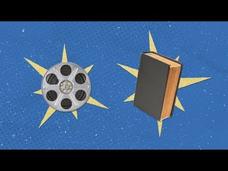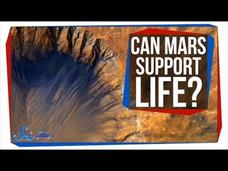Federal Reserve Bank
The Fed's Role in Making and Setting Monetary Policy: Part 1
How does inflation affect the economy, and how can effective monetary policy by the Federal Reserve help control inflation? With the Fisher equation and analysis of annual CPI rates during the 1970s and early 1980s, your class members...
Amoeba Sisters
Enzymes and ... Pac-Man?
What did the enzyme tell her substrate? You complete me! An instructive video uses a great comparison of enzyme shape and function to the game Pac-Man. After explaining the concepts, the resource offers a real-world example that...
Crash Course
The Digestive System
The human body produces about 1.7 liters of saliva a day to aid in digestion. The digestive systems of different organisms are examined in a video that follows the digestive path, beginning with acids, moves to the importance of surface...
Be Smart
How Bees Can See the Invisible
What do bees use to get rid of tangles? A honey-comb! The video focuses on how bees instinctively find flowers — their eyes view the world differently than ours. They also seem to be guided by electric charges because the bees have a...
SciShow
How To Make Antivenom
You are nine times more likely to die from a lightning strike than a snakebite, thanks to anti-venom. But where does anti-venom come from? Viewers follow the process of making anti-venom, beginning with the discovery of how to make it...
MinutePhysics
The Higgs Boson, Part II: What is Mass?
If you're reading this, thank the Higgs field! The second video in a series of three describes how matter is given mass via the Higgs field. Pupils discover the difference between particles with and without mass and how they interact...
MinuteEarth
Garbage Doesn't Lie
What does your garbage say about you? Young scientists dig through a video about things people cast aside. The narrator shows the fascinating things in George Washington's garbage pile, ancient Roman garbage, and how the landfills we...
MinuteEarth
Why Is a Group of Crows Called a “Murder”?
Fifteenth-century hunters used a unique vocabulary to describe the groups of animals they hunted. The video lesson shows many of these informal names. It turns out the names may not be official, but many people use them, including...
Periodic Videos
Beryllium
In some countries, beryllium goes by the name glucinium. The fourth video in a series about chemical elements explains the unique properties of beryllium as well as its uses. It also highlights the dangers of working with beryllium in...
PBS
When the Book is Better than the Movie
Sometimes the book is better than the movie; other times, the movie comes out on top. A video discusses the topic of novels and their film adaptations, pointing out specific texts and how the tale translated to the big screen. The...
California Academy of Science
Waste Water Recycling
What types of water qualify for recycling and how does the recycling process work? The eighth lesson in the 10-part series exploring Fresh Solutions presents both the financial and water savings associated with emerging recycling methods.
SciShow
Could Complex Life Survive on Mars?
Is there life on Mars? Is it likely? A video lesson analyzes the possibility of life on Mars. The discovery of water on Mars changes how scientists think about the likelihood of life on the red planet. Part of the SciShow Space series,...
SciShow
The Hunt for the First Neutrinos in the Universe
How far back in time can scientists see? Currently, the earliest photo of the universe is the cosmic microwave background, but math models prove the universe existed long before that time. An installment from the SciShow Space series...
Math Antics
Convert Any Fraction to a Decimal
Find another way to write a fraction. Using long division, the video shows how to convert a fraction into a decimal. Learners use their knowledge of fractions to then set up the division problem.
Bite Sci-zed
Theory vs. Scientific Theory
Why do people have scientific theories but not scientific facts? A quick video presentation defines scientific theory and the components necessary for developing a theory. The presenter emphasizes the difference between scientific proof...
FuseSchool
What is a Function
All you want to know about functions is right here. Individuals learn the definition of a function by watching a video. They also see how to evaluate a function and use function notation.
Curated OER
Stereoisomers, Enantiomers, Diastereomers, Constitutional Isomers and Meso Compounds
Sal works through a list of examples that demonstrate and review the different types of compound classification.


















